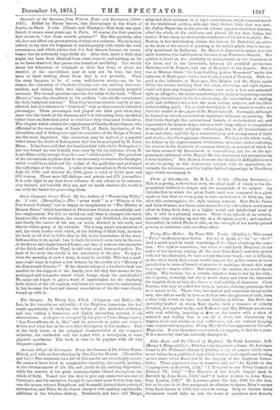Owen Gwynne's Great Work. By the Author of " Wandering
Willie," &c. 2 vols. (Macmillan.)--The " great work " is a" History of the Fourteenth Century," not so happy an imagination as " The History of Human Error," which furnished to Pisistratus Caxton a manifestly end- less employment. For this he sacrifices, and what is stranger, his stern, business-like wife sacrifices, his occupation and livelihood, his capital, and finally the career of his son, an artist, devoted to his work, and almost within grasp of its rewards. The young man's renunciation of self, the stern resolve with which, at the bidding of filial duty, he turns his back on all that he bolds dear in life, is the fine feature of the story- Self-sacrifice is its moral ; how it finds its reward even here in the case of the brave and single-hearted Lance, and how it redeems the character of the fickle and shallow Nigel, is told with much force and pathos. The fault of the story lies chiefly in the machinery of the plot. To appre- ciate the meaning of such a story, it must be credible. Who but a mad- man could hope to replace a lost fortune by the profits of a " History of the Fourteenth Century ?" If the slender salary of a banker's clerk was needful for the support of the family, how did they find means for the prolonged and extensive travel which brings about the catastrophe ? We must not forget to give a word of appreciation for the charming little sketch of the old captain, who loves art not because ho understands it, but because the best and dearest associations of his life were closely bound up with it.






































 Previous page
Previous page